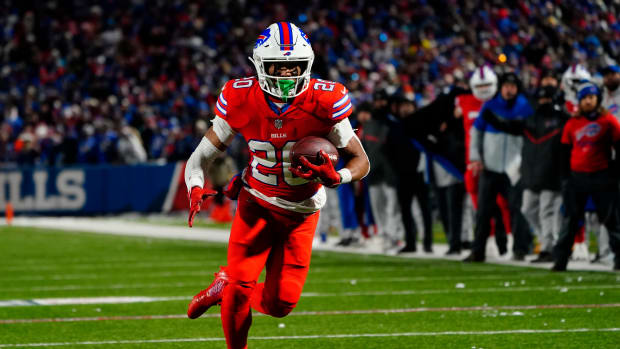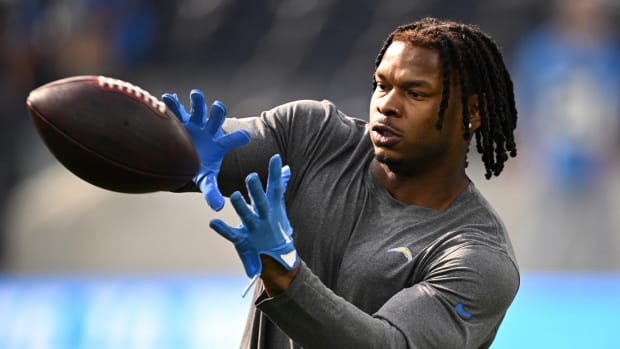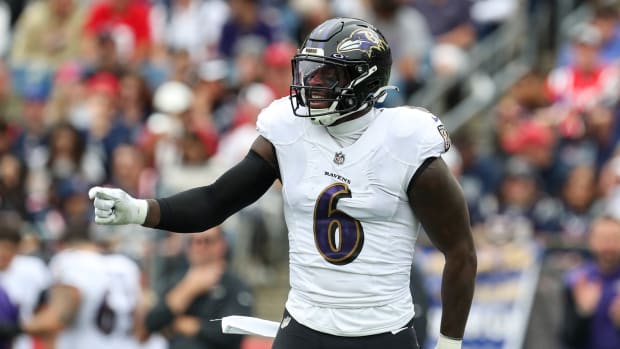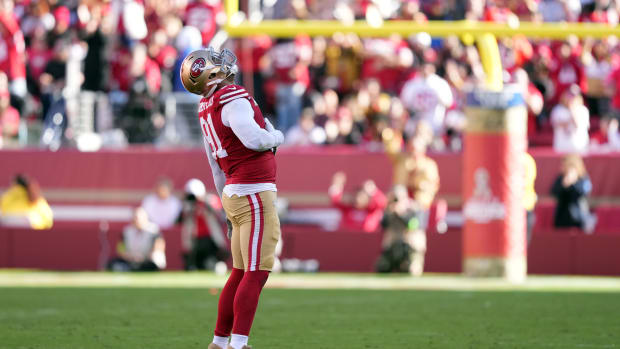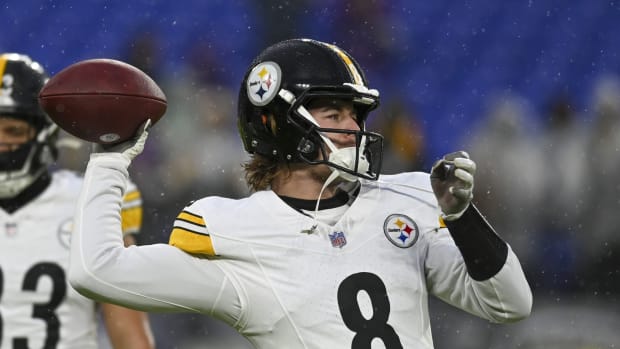Ray Lewis Is Still Not Making Sense
What was Ray Lewis doing during the Super Bowl blackout? Devising conspiracy theories, apparently.
Here’s an entertaining thought to contemplate as those last few remaining hours until the regular season opener tick down: Ray Lewis is about to start his career as an NFL talking head.
The man who recently authored the Super Bowl-blackout conspiracy theory, and who friend and former teammate, Joe Flacco, said didn’t make sense about 90 percent of the time in those made-for-television pre-game histrionics, will soon come into our living rooms on a weekly basis and give us the NFL world according to Ray.
This could be fun.
I don’t really care what ESPN is paying the former Baltimore Ravens great this season to impart his wealth of football insights. I’m more interested in what ESPN is paying the person who’s paid to keep Lewis on point, because that’s the toughest job in television this year, bar none.
Hang in there, America. If Lewis’ own quarterback didn’t know what he was talking about most of the time, there’s no reason we should be expected to. About the only thing we can count on is that Lewis will come out with a certifiable beauty every once in a while, like when he told the NFL Films’ America’s Game documentary series that he thinks someone turned the lights out on purpose in the second half of last season’s Super Bowl in New Orleans, with the Ravens up by 22 and in the process of blowing out San Francisco. You know, just to keep things interesting.
“I’m not gonna accuse nobody of nothing—because I don’t know facts,’’ Lewis said (and that much I agree with). “But you’re a zillion-dollar company, and your lights go out? No. No way.’’
Then, as only he can do, Lewis pivoted to growing up poor, and unpaid electric bills, and times getting hard, subtly intimating that the NFL and CBS (which carried the game) doesn’t really fall into that same socio-economic category.
“You cannot tell me somebody wasn’t sitting there and when they say, ‘The Ravens (are) about to blow them out. Man, we better do something,’ ’’ Lewis said. “That’s a huge shift in any game, in all seriousness. And as you see how huge it was, because it let them right back in the game.’’
Right. And Baltimore’s defensive letdown had nothing to do with that 17-point 49ers comeback after the lights went back on in the Superdome. It was the 34-minute blackout that entirely dictated the game’s proceedings. In all seriousness, that’s a darn handy way of looking at things if you happen to be the Ravens' longtime defensive captain, but the rest of us are due back on planet Earth now.
And who knows, the Super Bowl blackout conspiracy—which has been formally debunked by the Warren Commission—could be just the appetizer in the feast to come with Lewis’ new career as a TV analyst. Monday nights may never be the same now that the future Hall of Fame linebacker has joined ESPN’s desk full of football experts.
C’mon, man, indeed.
Honesty compels me to point out that it’s we in the sports media, of course, who are partly to blame for treating every utterance from Lewis these past dozen or so years like pearls of wisdom handed down from on high. With or without something relevant and insight to say on a topic, his words were elevated to the level of headline news. He was the sage of Baltimore, and his seniority, gift of leadership and on-field heroics easily made for an iconic standing that was forged over the course of his 17 NFL seasons.
I get that. But as much as some want to make him out to be, Ray Lewis is not Buck O’Neill in football cleats. Not-to-be-missed life lessons don’t just tumble effortlessly out of his mouth. As Flacco succinctly noted, and the cameras always captured, Lewis at times spoke borderline gibberish in those passionate pre-game speeches he delivered to his team. It wasn’t so much what he was saying but how he was saying it (or screaming it) that seemed to work for Baltimore’s motivational purposes. It was a call to arms that made for much better theater than oratory. Kind of like John Belushi’s classic “When the Germans bombed Pearl Harbor’’ speech by Bluto in Animal House. (“Forget it, he’s on a roll.’’)
Ray's New Role
He was one of the most intense and passionate players ever, but can Ray Lewis succeed on TV? Richard Deitsch examines.
You can also check out Deitsch's 2013 NFL Broadcast Guide, with everything you need to know about where, when and how to get your football coverage on TV this season.
Off the field and away from the action, Lewis naturally can be much more thoughtful, articulate and soft-spoken, and he is reportedly doing well in learning the mechanics of broadcasting. But he can also speak in confusing, mysterious and circuitous ways at times, and occasionally goes off the conversational deep end, as the Super Bowl blackout conspiracy illustrated. It can be tough to follow his train of thought, which at times sounds as if it travels on a track only he can recognize.
I know one of the most pressing topics I want to hear Lewis delve deeply into in his new role on ESPN, but I doubt very much it’s going to get a lot of air time from him on Monday nights or Sunday afternoons: Lewis is uniquely qualified to shed light on the NFL’s major story of the offseason, the Aaron Hernandez murder charge, and how his own experience in the legal crosshairs of a double murder case played out in 2000. He has yet to say much about the Hernandez case, telling The MMQB’s Richard Deitsch in July that he would be “careful’’ with the issue:
“It would only be to give a brief explanation on what you know,’’ Lewis said. “Because if you are talking about getting into the case—what happened, how it happened—that’s the judge’s job, that’s the police’s job. Having gone through the things I have been through, what I learned from that is everybody has something they want to say, and 80 percent of them are illiterate. You have to be careful with it. You can’t speak about something you do not know. Give your opinion, and keep it moving from there.’’
Ah, but for Lewis, speaking about something you do not know means one thing in the Hernandez case and apparently another in regard to his suspicions about the Super Bowl power outage. It’s that ability to talk out of both sides of his mouth that could make Lewis must-see TV this fall. I know I’ll be watching.


































